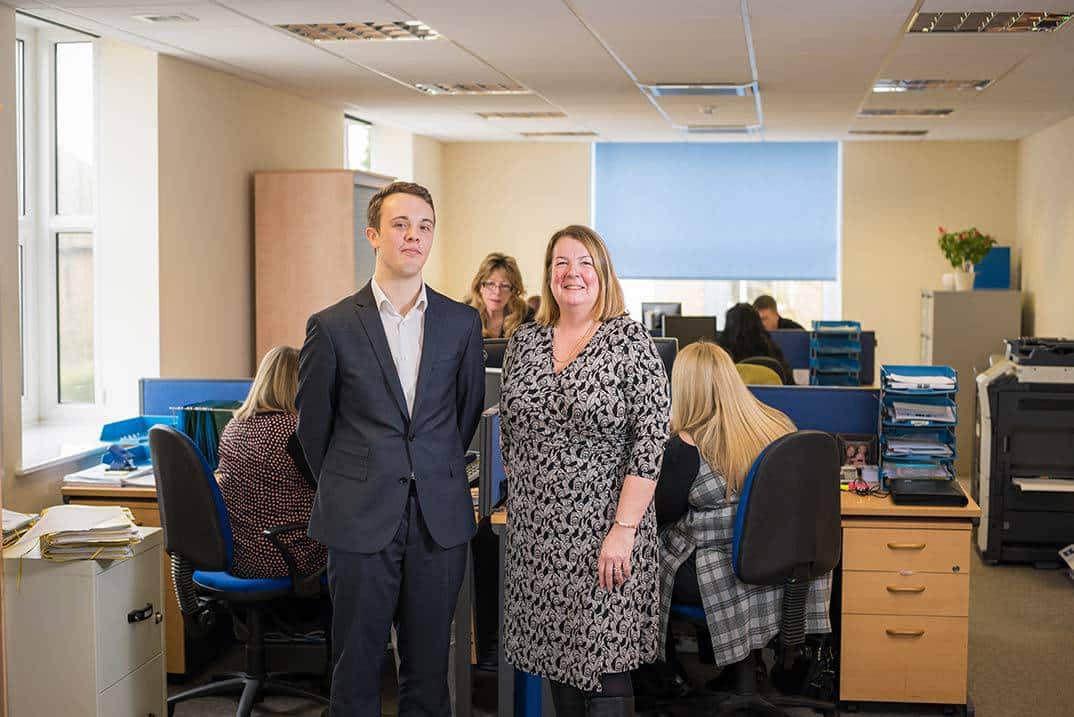Apprenticeships are back in fashion.  Not so long ago they were viewed as a relatively easy way to enter the job market if all else failed. That’s all changed and today apprenticeships are being offered in both white and blue collar jobs and are seen more and more as way to harness new talent.
One such firm taking this view is Paddock Wood-based IGF Invoice Finance, a company which specialises in providing businesses with loans that ensure cash flow is kept steady while they await payment for goods or services.
The company, run by Tracy Ewen, took on its first apprentice six months ago, with 19-year-old Alex Kelsall now halfway through the year-long programme.
Explaining the reasoning behind setting up the apprenticeship scheme for IGF, Mrs Ewen says: “It gives us the ability to nurture our own talent and skill them up in a way that benefits the business.”
But she is adamant that the benefits do not come from ‘cheap labour’. Instead the hope is Alex will choose to stick with the company once his apprenticeship is over.
“Legally we could pay the minimum apprentice wage but we are not in this for cheap labour or someone who is just going to do the office photocopying,” Mrs Ewen adds.
“Those places which pay the bare minimum inevitably see a high drop-out rate as young people realise they can make more simply working for the supermarket over the road.
“We spent weeks planning the programme to ensure Alex spends a month in each department. That way he can see how it all works in a joined-up approach.”
The benefits of being an apprentice are not lost on Alex, who decided to avoid university as he wished to remain close to home and avoid the cost.
He was also pleased to find an apprentice scheme which nurtures his talents and appeals to his interests, admitting he is not a ‘hands-on’ person with an aptitude for manual work.
The former Tunbridge Wells Grammar School for Boys pupil, who spends one day a week at West Kent College as part of the programme, says: “From quite early on in my GCSEs I realised I wanted to pursue a career involving maths as I enjoy working with numbers.
“I would be interested in things many people may find boring. For instance, I have been doing auditing here and I enjoy the implications of it.”
Being put into a real working environment also appealed to Alex, who believes learning on the job suits him better than a university education.
He says: “I think the best way to learn is by being thrown into the deep end so you can see how each situation develops, how things really work and how to fix problems.”
Mrs Ewen is in no doubt the scheme is successful.
“It has proven to be a win-win for us,” she says, adding: “Not only have we been able to give someone
an opportunity to learn the business through a massive training curve, but it has also benefitted
the staff by ensuring they are skilled up enough to impart their own knowledge to Alex.”
However, she believes more can be done to ensure a higher take-up of the opportunities out there and to facilitate the creation of more apprenticeship places.
“We work well with West Kent College, but although there is great enthusiasm at the top of government the delivery is not very efficient.
“They need to spread the enthusiasm to more local colleges and schools as many do not offer the chance for their students to do apprenticeships as they are focused on university.”
And she encourages other firms to follow the example of IGF Invoice Finance: “Ultimately, the costs of running a programme are minimal compared to the massive returns you can get.”
Tracy Ewen’s top tips for winning a placing
What did IGF look for in an apprentice’s CV?
“IGF specifically wanted a candidate with three A levels, so that level of academic achievement was important to us. However, these qualifications did not necessarily have to be top level, and were more to prove ability to a certain academic standard.”
How can a candidate demonstrate good employability skills, even without much work experience?
If a candidate has been in a sports team, for example, this demonstrates that they are a team player and work well with others; if they were captain, it exhibits leadership skills. There are several ways to demonstrate employability skills – it is just a matter of identifying them. Whether working on a Saturday in retail or volunteering at a local children’s group, it shows good communication and organisational skills that the candidate might not have been able to otherwise prove.
How should a candidate dress for an interview?
“Dressing for the environment a candidate expects to be working in is really important. If that’s in an office, consider business attire – at the very least, a collared shirt and trousers or a skirt that isn’t too short.”
What should a candidate do if they are shy in an interview?
The best thing to do is to tell the interviewer that you are shy or that you find talking about yourself quite difficult. This actually shows good character, and the interviewer will take it into account for the duration of the interview. This will avoid a candidate just muddling through and the interviewer not necessarily realising there is a problem.








